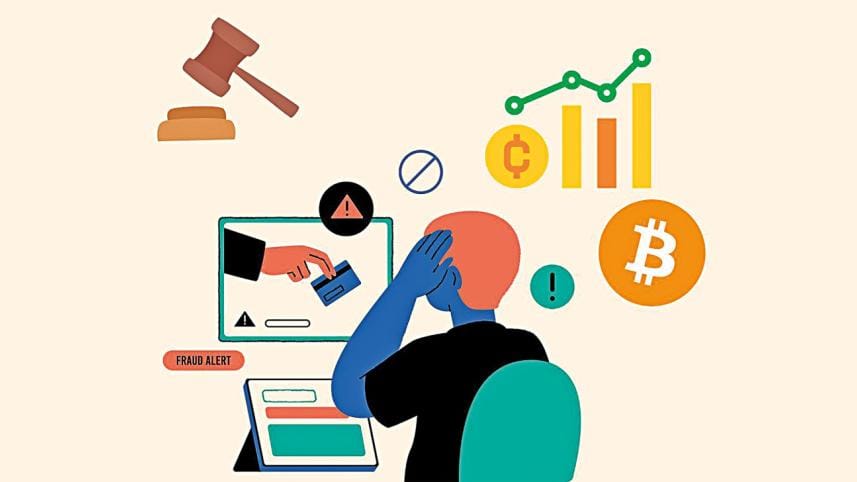Financial literacy: A key defence against fraud

As we approach Financial Literacy Week 2025, scheduled from March 17 to March 23, we have an opportunity to reflect on the state of financial literacy in Bangladesh. It comes at a time when financial influencers (Finfluencers), herd mentality, biased advice, and peer or social media pressure have become significant factors shaping financial decisions. Financial literacy is crucial in empowering individuals to make informed choices that align with their long-term financial goals, rather than blindly following trends without understanding the consequences.
Additionally, the financial sector is increasingly targeted by various types of fraud, including phishing, identity theft, credit card fraud, and Ponzi schemes. Scammers are becoming more sophisticated, and unfortunately, many individuals continue to fall victim to these schemes, suffering financial loss and emotional distress. However, financial literacy can combat these risks.
What is financial literacy?
Financial literacy refers to the ability to understand and effectively manage personal finances. It includes knowledge of budgeting, saving, investing, borrowing, and financial planning. A financially literate individual can make informed and responsible financial decisions, ensuring their economic well-being. More importantly, financial literacy equips individuals with the skills to identify, avoid, and respond to fraudulent banking activities.
By fostering a deeper understanding of how financial institutions operate, how transactions work, and how to protect personal information, financial literacy serves as an essential defence against fraud.
Before exploring how financial literacy helps prevent fraud, it is essential to understand the various types of financial scams individuals may encounter:
Phishing scams
Phishing occurs when fraudsters impersonate legitimate financial institutions to deceive people into providing sensitive information such as bank account details, credit card numbers, CVV codes, PINs, and OTPs. These scams typically involve fake emails, phone calls, or websites that closely resemble legitimate ones.
Spear phishing
Spear phishing is a more targeted form of phishing where cybercriminals personalise their messages using gathered information, making the scam more convincing. This type of attack is more dangerous than general phishing due to its precision and customisation.
Vishing (Voice or VoIP phishing)
Vishing occurs when attackers impersonate banks or government agencies over phone calls or Voice over IP (VoIP) to trick individuals into revealing personal information. Fraudsters often create a sense of fear or urgency to manipulate their victims.
Smishing
Smishing is SMS-based phishing, where cybercriminals send fraudulent text messages that appear to be from trusted sources. These messages often contain malicious links or request sensitive information, potentially leading to malware infections or identity theft.
Pharming
Pharming is a cyberattack that redirects a website's traffic to a fraudulent website without the user's knowledge. Victims unknowingly enter their login credentials on a fake banking website, leading to stolen data or malware infections.
Fake security alerts
Fraudsters send fake security warnings claiming that a user's system is compromised. These alerts trick users into downloading malicious software or providing personal information under the guise of securing their accounts.
Identity theft
Identity theft involves the unauthorised use of someone's personal information to open bank accounts, apply for loans, or access existing accounts, leading to financial loss and damage to credit profiles.
Credit card fraud
Credit card fraud occurs when a thief gains access to a person's card details and makes unauthorised transactions. This can happen through stolen cards, skimming devices, or online data breaches.
Loan scams
Scammers lure victims with fake loan offers that promise low interest rates or quick approvals. They demand upfront fees and disappear without disbursing any funds.
Ponzi and pyramid schemes
These fraudulent investment schemes promise high returns with little or no risk. They rely on new investors' funds to pay earlier investors, eventually collapsing when there are no new participants.
Recognising red flags of fraud
One of the key benefits of financial literacy is the ability to identify warning signs of fraud. Financially literate individuals are more likely to recognise scams that seem "too good to be true," such as unrealistic returns on investments or unsolicited requests for personal information.
Understanding banking policies and security features
Financial literacy helps individuals understand how their banks operate and the security measures in place to protect their accounts. This includes:
- Recognising legitimate communication channels (official emails, secure websites, customer service numbers).
- Understanding how to dispute unauthorised transactions and report fraud.
With this knowledge, individuals can quickly identify suspicious activities and protect their assets.
Secure banking practices
A financially literate person knows the importance of:
- Regularly updating passwords and using strong, unique passwords.
- Enabling two-factor authentication for added security.
- Monitoring bank statements for any unusual transactions.
- Never sharing sensitive information (PINs, passwords, OTPs) over untrusted channels.
Recognising financial scams
Financial literacy enables individuals to differentiate between legitimate investment opportunities and scams. Understanding how real investments work helps prevent falling for Ponzi schemes and fraudulent financial offers.
Safe internet banking practices
As digital banking grows, so do online fraud risks. Financially literate individuals know how to:
- Identify secure websites (look for "https" and security certificates).
- Avoid phishing emails and fraudulent links.
- Secure their devices with updated software and antivirus programmes.
Staying informed and engaged
Customers who stay updated on their financial portfolio receive timely alerts from their financial institutions, helping them detect fraud early and take protective measures.
Knowledge of financial rights and consumer protection
Financial literacy includes awareness of consumer rights, such as:
- How to file complaints with regulatory bodies.
- How to freeze accounts in case of fraud.
- Steps to take if identity theft occurs.
This knowledge empowers individuals to take swift action when fraudulent activity is suspected.
The role of banks in promoting financial literacy
Banks play a crucial role in fostering financial literacy among customers and communities. Many financial institutions offer:
- Educational programmes and online resources.
- Advisory services on financial security.
- Fraud alerts, account monitoring, and secure banking tools.
By enhancing financial education, banks help individuals protect themselves from financial fraud.
A collaborative effort
In the fight against financial fraud, financial literacy is one of the most powerful tools. As per the Financial Literacy Guidelines for Banks and Financial Institutions by Bangladesh Bank, banks, financial institutions, and regulatory bodies must work together to:
- Promote financial literacy.
- Empower customers to recognise and protect themselves from fraud.
Ultimately, financial literacy is not just about managing money—it's about securing one's financial future. By investing in education, awareness, and vigilance, we can create a more secure financial environment, where individuals are empowered to protect themselves and make sound financial decisions.
Md Rashed Akter is head of Retail Distribution Division and chief bancassurance officer (CBO), Midland Bank PLC.
Views expressed in this article are the author's own.
Follow The Daily Star Opinion on Facebook for the latest opinions, commentaries, and analyses by experts and professionals. To contribute your article or letter to The Daily Star Opinion, see our guidelines for submission.




 For all latest news, follow The Daily Star's Google News channel.
For all latest news, follow The Daily Star's Google News channel. 


Comments